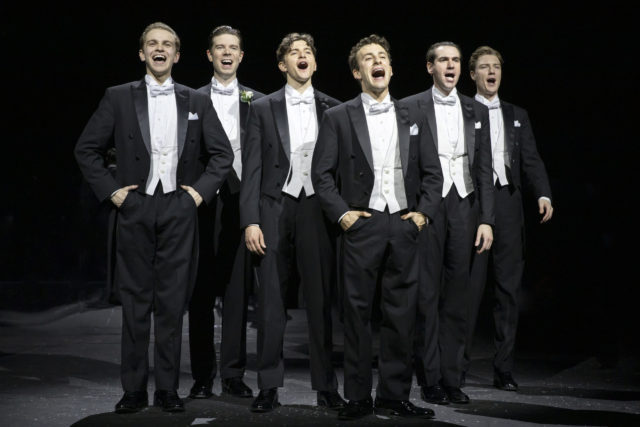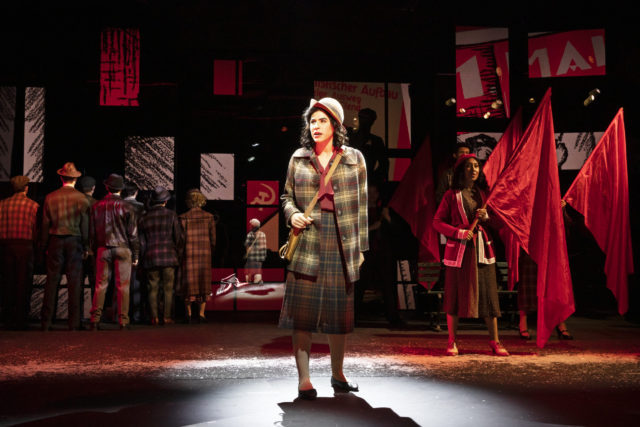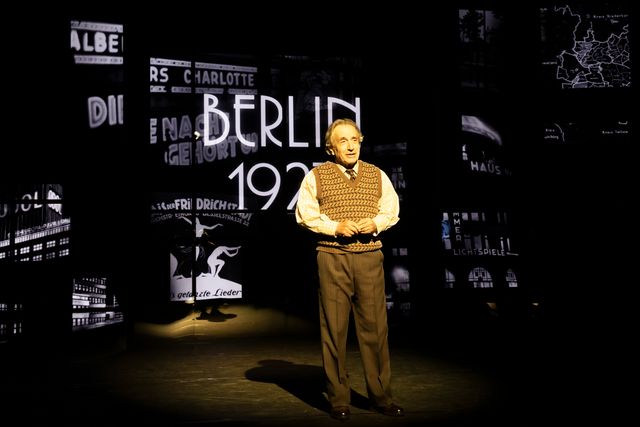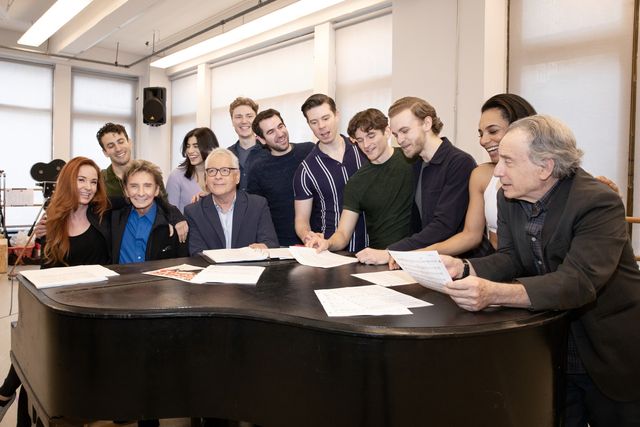
Barry Manilow musical tells real-life story of the Comedian Harmonists (photo by Julieta Cervantes)
HARMONY: A NEW MUSICAL
National Yiddish Theatre Folksbiene
Museum of Jewish Heritage — A Living Memorial to the Holocaust
Edmond J. Safra Hall, 36 Battery Pl.
Through May 15, $79-$129
nytf.org/harmony
“A Bulgarian singing waiter, a doctor, a bass from the Comic Opera, a musical prodigy, a whorehouse pianist . . . and a Polish Rabbi walk into a bar,” Josef Roman “Rabbi” Cykowski (Chip Zien) says near the beginning of Harmony, the biographical musical that opened tonight at the Museum of Jewish Heritage — A Living Memorial to the Holocaust, presented by the National Yiddish Theatre Folksbiene.
Throughout his nearly sixty-year career, Brooklyn-born songster Barry Manilow has won a Tony, two Emmys, a Grammy, and an honorary Clio for his classic jingles and has released more than three dozen albums (including eight gold and eight platinum records) that have sold more than eighty-five million copies. But his favorite creative endeavor is Harmony, the twenty-five-plus-years-in-the-making musical about the Comedian Harmonists, the real-life a cappella German singing group whose international success was ultimately thwarted by the Nazis; composer Manilow and his longtime collaborator, Queens native Bruce Sussman, who wrote the book and lyrics, seek to restore the Harmonists’ legacy in this glittering show.
The story is told in flashback by the older Rabbi, who details how the group formed and became a sensation despite some initial stumbles; he pontificates on many of the choices they made, especially those by his younger self (Danny Kornfeld), while sometimes joining them in song. Originally known as the Melody Makers, the ensemble was put together by actor and composer Harry Frommerman (Zal Owen) and consisted of Rabbi, Comic Opera bass Robert “Bobby” Biberti (Sean Bell), medical student Erich Collin (Eric Peters), piano player Erwin “Chopin” Bootz (Blake Roman), and singing waiter Ari “Lesh” Leshnikoff (Steven Telsey). In addition to their glorious harmonies and goofy charm, they used their voices as instruments, making it sound like they were performing with a band.

Ruth (Jessie Davidson) is ready to fight what’s coming in Germany in Harmony (photo by Julieta Cervantes)
As their fame spreads, Rabbi falls in love with Mary (Sierra Boggess), a Christian who considers converting to Judaism but is also worried about the growing anti-Semitism emerging from the National Socialists, and Chopin marries Ruth (Jessie Davidson), a staunch Jewish activist who is ready to fight against the rise of the far right. As Nazi officers start showing up at their concerts, including a standartenführer (Andrew O’Shanick) and his wife, Ingrid (Kayleen Seidl), who are huge fans, the Comedian Harmonists realize they are caught in the middle of something a lot bigger than themselves and have to take a long, hard look at their personal and professional futures.
Harmony premiered at La Jolla Playhouse in 1997, with Danny Burstein as Rabbi and Rebecca Luker as Mary. (The two got married in 2000 and remained so until Luker’s tragic death in 2020.) Manilow and Sussman, writing partners for more than forty years, have continued to tweak the show since then; today it feels oddly prescient as dictators and the far right gain power around the world and so many oppressed people become refugees as they try to escape bad situations that are only getting worse. It is also an excellent way to celebrate the little-known a cappella group, as there are only limited archival footage and audio recordings available online, in addition to a 1991 German documentary, a 1997 German biopic, and a 2010 English-language book.
The six actors portraying the Comedian Harmonists are terrific, forming a cohesive unit in, well, perfect harmony. Director and choreographer Warren Carlyle (After Midnight, On the Twentieth Century) has fun with the sextet, particularly in a scene in which they have no pants. Characters often enter and leave through the aisles, approximating the feel of watching the Comedian Harmonists in a 1920-’30s theater rather than a contemporary venue. And the Museum of Jewish Heritage is just the right place to stage this show, an institution dedicated to preserving the Jewish experience before, during, and after the Holocaust.

Chip Zien gives a bravura performance as Rabbi Josef Roman Cykowski and others in Harmony (photo by Julieta Cervantes)
The musical is about a tight-knit ensemble, but it’s worth seeing for Zien (Into the Woods; Caroline, or Change) alone; a New York City theater treasure, Zien is spectacular as Rabbi, who can’t help but get emotional as he watches mistakes his younger self and the troupe make. Zien also dazzles by taking on a number of minor roles, changing costumes — and wigs — lightning fast as he transforms himself into Marlene Dietrich, Richard Strauss, and Albert Einstein. (The costumes, which range from humble street clothes to pristine tuxedos to Nazi uniforms, are by Linda Cho and Ricky Lurie, with hair and wigs by Tom Watson.) Zien leaves Ana Hoffman to regale us as Josephine Baker, who did in fact perform with the Harmonists.
Three-time Tony winner Beowulf Boritt’s set is anchored by a wall of mirrors that reflects the performers — and the conductor, who leads the orchestra from a pit in the right side of the audience — and also on which are projected archival photographs, text identifying the time and place, and Nazi symbols. Among the locations are various nightclubs in Berlin, Tivoli Park in Copenhagen, a movie set in Cologne, a night train to Munich, the tailor shop where Mary works, and Carnegie Hall, where the Comedian Harmonists headlined in 1933.

Barry Manilow and Bruce Sussman rehearse with the cast of Harmony (photo by Julieta Cervantes)
At 165 minutes (with intermission), the show, featuring music direction and additional arrangements by John O’Neill, is at least a half hour too long, dragging primarily during the romantic numbers; there’s much more life when the German boy band is performing and when the political tension increases — to a point where the characters are making potential life-or-death decisions.
And as much as Harmony is specifically about the Comedian Harmonists, it also reminds us how we all should be with others, particularly in times of strife. As the cast sings in the title song: “Oom-pah-pah, oom-pah-pah, / Oom-pah oom-pah oom-pah, / Harmony, / We sing in harmony / Like the robins in Herald Square. / Harmony, / The thing is harmony, / Always knowing there’s someone there. / In this joint / All encounters with counterpoint / End in harmony. / And it’s clear / No man’s a solo here. / Not even me! Me! Me! Me! Me! Me! / No solo mio! / Just harmony.”